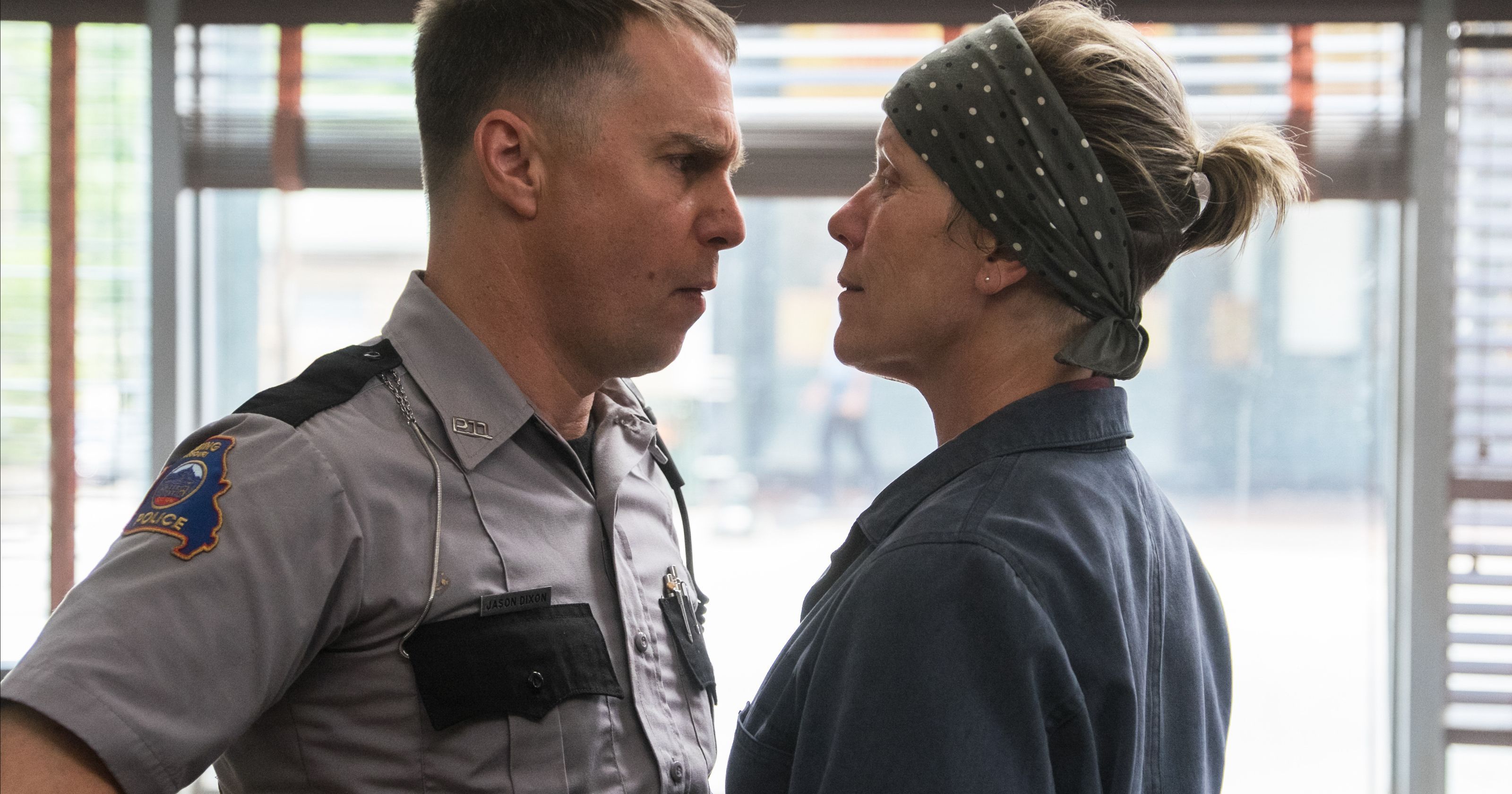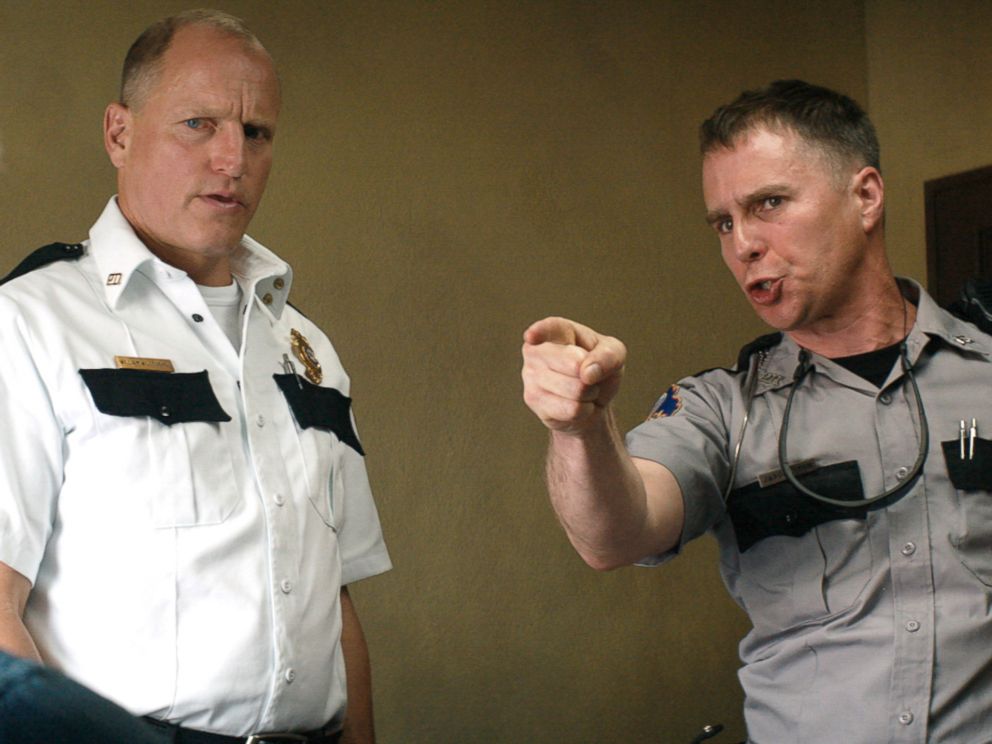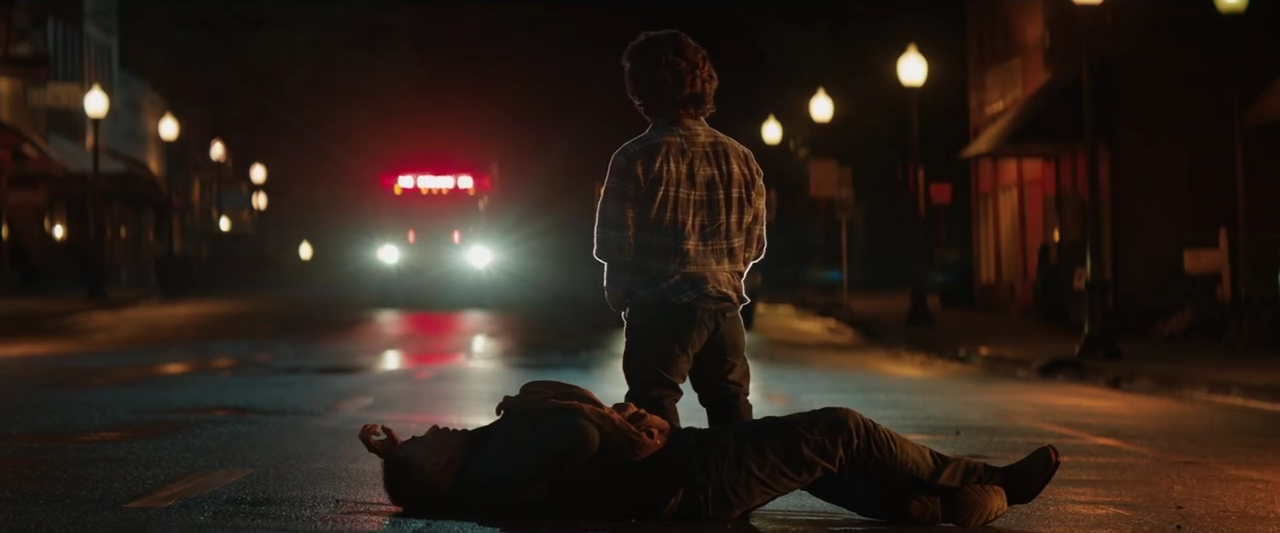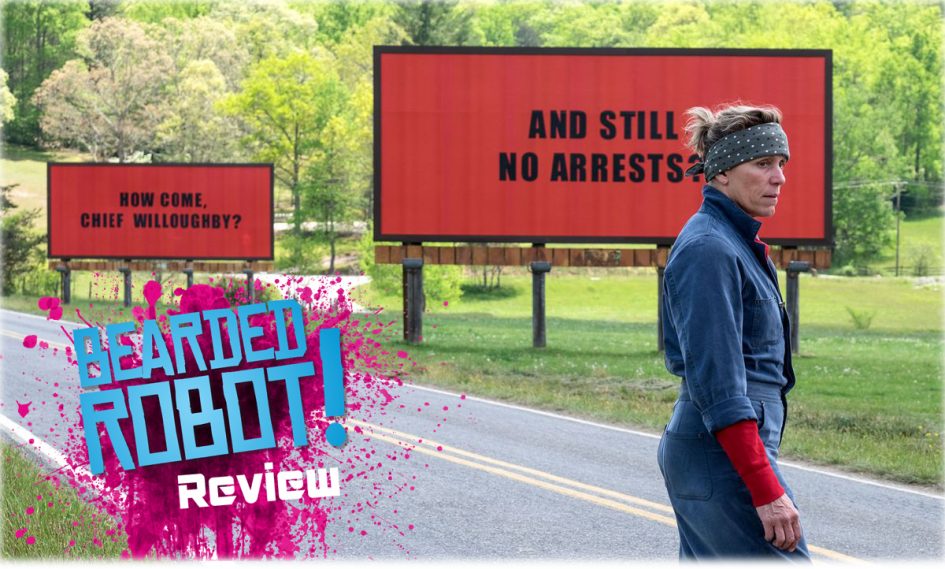Usually when a film has a bit of an obscure or random title (such as Reservoir Dogs, No Country for Old Men, A Clockwork Orange, A Fist Full of Dollars) then it normally has nothing to do with the actual movie at all. We can go the entire length of the film and be left thinking afterwards “Why the hell did they call it that?”, and I thought that this was going to be the case with Three Billboards Outside Ebbing, Missouri, but the truth of the matter is that I have never been so wrong. The entire film is completely relevant to the three billboards that they may as well have been the stars of the show.
TBOEM (?) is the Cohen Brothers film that the Cohen Brothers didn’t actually make. It is a pure imitation of their work, but in a good way, not in a completely ripped off way. The film has all the classic calling cards of a Cohen Brothers film such as simple every day characters who are caught up in a mess that seems to just spiral out of control, as random acts that seem to push the story forward, or completely mix it up entirely. Three Billboards Outside Ebbing, Missouri (I didn’t like that abbreviation) has all of this but manages to make it their own. If you told me that the Cohen Brothers directed or even produced it, then I would not be surprised in the slightest. I mean it even stars Frances McDormand from the Cohen classic; Fargo.
It is a black comedy as well, which is another Cohen special, so you will find yourself chuckling or even laughing at certain points, but it is within these moments that the film likes to pull the rug out from under you and deal you a hefty gut punch, so you will need to keep your guard up throughout as the truly unexpected can occur at any second.

The film is a little strange at first as you are not entirely sure what is going on for the first 15-20 minutes, as a woman (Frances McDormand) decides to rent three billboards that she has seen are currently unused outside the town of Ebbing in the state of Missouri (see how I incorporated the entire title into that sentence? That was not by accident), and pay for the billboards up front. The billboards themselves are on a desolate road that no one really uses, and the small advertisement company, who owns them, of them finds it incredibly odd that she wants to rent them for the entire year.
During this part of the film we are introduced into the other key characters who are the focus of this movie; Woody Harrelson, playing the town police chief who everyone seems to like and appears to be a kind and sympathetic man, and Sam Rockwell, who is one of the police deputies in town and a bit of a red neck. It is rumoured that he brutally beat a black suspect during an interrogation.
Anyway, it is not until Rockwell is heading out and actually sees what the lady has paid to put up that the real story of the film kicks in. The message on the billboards are revealed from front to back, one at a time, which builds the anticipation of what is actually coming. A single message is spread across all three of them saying the haunting words of “RAPED WHILE DYING”, “AND STILL NO ARRESTS?”, and “HOW COME, CHIEF WILLOUGHBY?” (Chief Willoughby being Woody Harrelson).
What happened was that Frances McDormand’s character’s teenage daughter left the house one day, a year ago, and never returned. Her burned corpse was later found and a preliminary examination reveals that she was raped as she lie dying.
It is all very hard hitting stuff that is thankfully never shown. As sometimes films do tend to show these moments for the pure shock value, but it is not always necessary. Like in this film, you can get your point across without being too graphic, and in today’s hard hitting world, where we have shows like Game of Thrones showing babies being murdered and rapes all happening before our very eyes, it is refreshing to see hard subject matter being dealt with in a subtle way.
Since this all happened a year ago in the story, and, if you haven’t guessed by the billboard’s message, no one has been caught and the case is now just left open, I feel that only having the characters mention this awful crime makes us feel like we are now just citizens of Ebbing who are hearing nothing but rumours long after the events have taken place.
It made me feel like the crime itself is not important, which is how everyone feels about it now that the case has just been forgotten (with the investigation already taking place and no other evidence can be found), which is exactly why the mother is fighting this case.

The billboards stir up a hornets nest as local news brings the case back into light, the police attempt to get the signs taken down, however, there is nothing illegal about them, so Rockwell’s character, trying to win the chief’s favour, tries a few dirty tactics (such as focusing on the Mother’s friends, or threatening the owner of the advertisement agency) to get the job done, as well as causing the investigation to be opened up once more.
Frances McDormand character’s son is enraged by his mother’s actions, as he did not wish to know the details of his sister’s murder, but now it is up in huge black letters for all to see, and this causes his dad, who is separated from the mother and now has a 19 year old awkward girlfriend, to come back into the fold as it is revealed that his child maintenance money is now paying for these billboards.
Did I mention that Peter Dinklage is in this film and plays the town midget?
The entire thing continues to spirals out of control, and about halfway through the film when SOMETHING happens, it turns the whole thing on its head, creating a whole new mess for everyone involved.
It is hard to feel sympathetic for some of the characters because of the actions that they take, however, they do such a good job at humanising them, even people like Rockwell’s red neck, slightly dimwitted character, that you cannot help but like them.
There is no real antagonist or main character of this film, as everyone appears to be grey rather than black or white.
Characters like the mother, who you feel you want to see get justice for her daughter, is later seen throwing Molotov cocktails at the police station (after hours). And Rockwell, who is seen throwing a seemingly nice guy out of a first floor window, is later shown attempting to solve the murder girl case.
The only character that I felt was the same all the way through was Harrelson. He played the calmly spoken chief who is now being thrown into the limelight and criticised for not solving the crime soon enough. He has a lot of other real life things going on that he is shown attempting to juggle and deal with all the while that this mess is occurring.

If you are looking for any type of closure, then you will not find it in Three Billboards Outside Ebbing, Missouri, and I do not mean for the case, but in terms of the films actual ending. There is a distinct lack of one, which can be a little frustrating as where the movie does end, we are eager to see the outcome of the events, regardless of how unnecessary they actually are.
Overall, if you like films created by the Cohen brothers, then you will enjoy Three Billboards Outside Ebbing, Missouri greatly. I am a huge fan of Fargo, and this really did have the same sort of ring to it. It is the classic case of something simple causing an enormous shit-storm. It does a good job of humanising its characters and pushing us on a variety of different emotional journeys as we watch them each individually deal with the mess that has been created around them.
The lack of a true ending to the film does make me feel like it was all a little for nothing, but it a great watch while it lasted.



6th February 2018 at 20:05
“After study a few of the blog articles with your website now, we truly such as your way of blogging. I bookmarked it to my bookmark site list and you will be checking back soon. Pls take a look at my site likewise and tell me if you agree.”